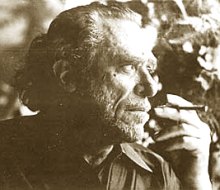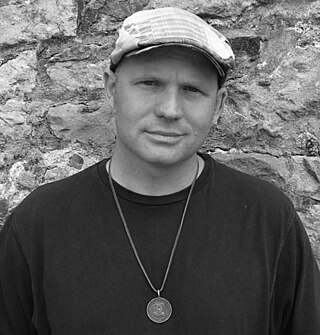
Henry Charles Bukowski was a German-American poet, novelist, and short story writer. His writing was influenced by the social, cultural, and economic ambience of his adopted home city of Los Angeles. Bukowski's work addresses the ordinary lives of poor Americans, the act of writing, alcohol, relationships with women, and the drudgery of work. The FBI kept a file on him as a result of his column Notes of a Dirty Old Man in the LA underground newspaper Open City.
Stephanie Bolster is a Canadian poet and professor of creative writing at Concordia University, Montreal.

Philip Lamantia was an American poet, writer and lecturer. His poetry incorporated stylistic experimentation and transgressive themes, and has been regarded as surrealist and visionary, contributing to the literature of the Beat Generation.
Lewis Putnam Turco was an American poet, teacher, and writer of fiction and non-fiction. Turco was an advocate for Formalist poetry in the United States.
Edwin Frank Ochester was an American poet and editor. He was born in Brooklyn, New York, and educated at Cornell, Harvard, and the University of Wisconsin–Madison.

Jack Micheline, born Harvey Martin Silver, was an American painter and poet from the San Francisco Bay Area. One of San Francisco's original Beat poets, he was an innovative artist who was active in the San Francisco Poetry Renaissance of the 1950s and 1960s.
Clark Coolidge is an American poet.

Harold Norse was an American writer who created a body of work using the American idiom of everyday language and images. One of the expatriate artists of the Beat generation, Norse was widely published and anthologized.
John Martin is an American publisher who founded the Black Sparrow Press. As a publisher, he is best known for his work with Charles Bukowski, John Fante, and Paul Bowles. He is based in Santa Rosa, California.

Frederick Arthur Nettelbeck was an American poet. In the early 1970s he began work on a long poem that was published in 1979: Bug Death. Cut-up and collage texts were combined with original writing to create Bug Death. His literary magazine, This Is Important (1980–1997), published such writers as William S. Burroughs, Wanda Coleman, John M. Bennett, Jack Micheline, Allen Ginsberg, Robin Holcomb, Charles Bernstein, John Giorno, Greg Hall, etc. His other publication of note was a Small press mimeo magazine: Throb (1971), publishing Al Masarik, Susan Fromberg Schaeffer, Gerald Locklin, Joel Deutsch, and 'Charles Bukowski answers 10 easy questions'. Nettelbeck's work, publications, and papers are collected in the Ohio State University Avant Writing Collection and the Sackner Archive of Concrete and Visual Poetry. His autobiography is published in Contemporary Authors, Volume 184. He lived in southern Oregon's Sprague River Valley.
Laugh Literary and Man the Humping Guns was a mimeographed literary magazine published between 1969 and 1971 in Los Angeles, California by Charles Bukowski and Neeli Cherkovski. The original title was to be "Laugh Literary and Man the Fucking Guns," but Cherkovski convinced Bukowski to substitute a less graphic word due to censorship concerns. In the late 1960s, the U.S. Post Office was actively prosecuting publishers for sending "obscene" publications through the mail. At the time of its publication, Bukowski was working as a clerk at the Post Office, having not yet made the transition to full-time writer.
Ole' magazine was one of the first small literary magazines produced by mimeograph to reach a nationwide audience. Published by Sacramento poet and editor Douglas Blazek, Ole' was at the heart of the Mimeo Revolution which saw underground presses publish non-establishment poets who could not get published in mainstream literary magazines such as Poetry Magazine.

Allan Davis Winans, known as A. D. Winans, is an American poet, essayist, short story writer and publisher. Born in San Francisco, California, he returned home from Panama in 1958, after serving three years in the military. In 1962, he graduated from San Francisco State College.
Wally Swist is an American poet and writer. He is best known for his poems about nature and spirituality.

Chad Sweeney is an American poet, translator and editor.

Larry D. Thomas is an American poet. He was the 2008 Texas Poet Laureate, and in 2009 was inducted into the Texas Institute of Letters.
Second Coming Press was a San Francisco-based small press founded by A. D. Winans that was in existence from 1972 to 1989. It specialized in publishing poetry and essays. Its published writers included Douglas Blazek, Charles Bukowski, Neeli Cherkovski, Art Cuelho, Paul Fericano, Gene Fowler, Hugh Fox, Linda King, Diane Kruchkow, Gerald Locklin, Al Masarik, Jack Micheline, Pablo Neruda, Morty Sklar and William Wantling.
Gerald Locklin was an American poet. He was a professor of English at California State University, Long Beach and the poetry editor of Chiron Review.

Mark Terrill is an American poet, translator, and prose writer who has resided in Northern Germany since the mid-1980s.
Fred Voss is an American poet and novelist who has written about the lives of American machinists working in factories for over forty years.








